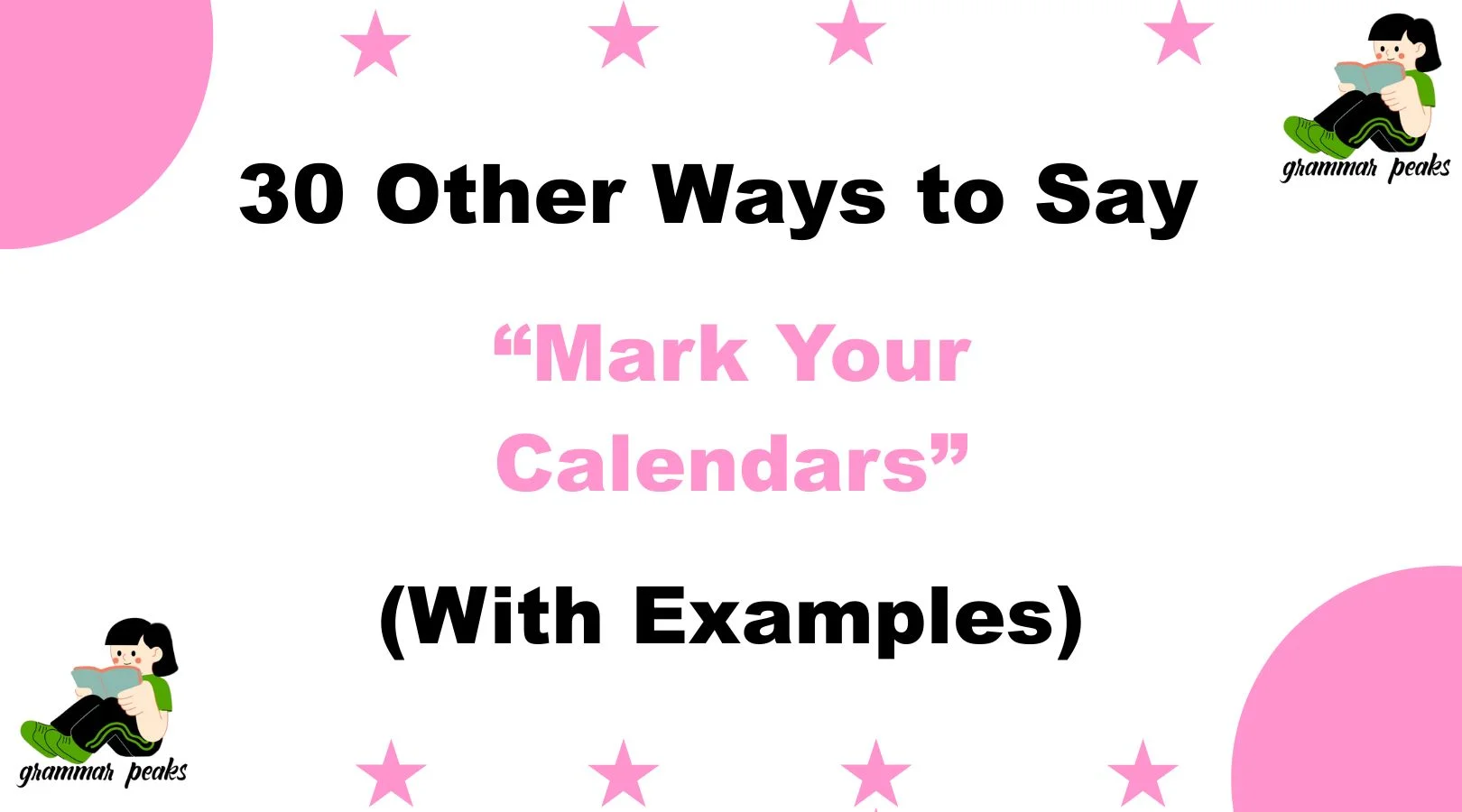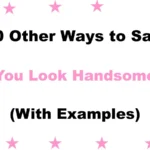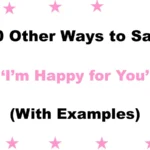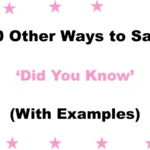Finding the right words to remind someone about an important date can make all the difference. Saying “Mark your calendars” is a common phrase, but sometimes it feels a little plain or impersonal. Whether you’re inviting friends, organising a meeting, or sending a heartfelt reminder, using different ways to express this idea can make your message feel more warm, thoughtful, and engaging.
This article offers 30 unique and meaningful alternatives to say “Mark your calendars” — each designed to help you communicate with care and clarity. With clear explanations, examples, and tips on when to use each phrase, you’ll be ready to make your reminders stand out with a personal touch.
What Does “Mark Your Calendars” Mean?
“Mark your calendars” is a friendly and commonly used phrase that means to remember or set aside a specific date for an upcoming event. It’s often said when someone wants to give advance notice about something important—like a meeting, party, or celebration—so others can plan ahead and avoid scheduling conflicts. The expression comes from the idea of literally marking a physical calendar to serve as a visual reminder.
When to Use “Mark Your Calendars”
Use this phrase when you want to:
- Remind people about upcoming events in a casual, friendly way.
- Encourage saving a date without pressure.
- Communicate urgency or excitement about the event.
Avoid using it in contexts where very formal or official language is needed.
Is It Professional/Polite to Say “Mark Your Calendars”?
Yes, but mostly in informal or semi-formal contexts. It is polite and approachable, making it great for emails, invitations, and announcements within teams or social groups. In highly formal or legal communications, alternatives with a more official tone might be better.
Pros and Cons of Saying “Mark Your Calendars”
Pros:
- Simple and clear.
- Friendly and approachable tone.
- Widely understood.
Cons:
- Can sound repetitive or overused.
- May feel informal in professional or serious contexts.
- Lacks uniqueness when used repeatedly.
Synonyms for “Mark Your Calendars”
- Save the Date
- Don’t Forget the Date
- Put It on Your Schedule
- Reserve This Day
- Pencil It In
- Make a Note of It
- Set a Reminder
- Keep This Date Free
- Circle the Date
- Lock It In
- Book the Date
- Jot This Down
- Remember This Date
- Add This to Your Planner
- Schedule It Now
- Keep This Day Open
- Note the Date
- Mark the Day
- Plan Ahead for This Date
- Highlight This Date
- Save This Day
- Don’t Miss It
- Put a Pin in It
- Flag This Date
- Hold the Date
- Make Time for This
- Write It Down
- Get Ready for This Date
- Make a Mental Note
- Prepare for the Date
1. Save the Date
Definition: A phrase used to alert someone to keep a specific date free for an upcoming event.
Detailed Explanation: Often used in invitations, especially weddings or formal events, to give advance notice before sending full details.
Scenario Example: Save the date for our annual charity gala on November 5th.
Best Use: Invitations, formal announcements, events needing early notice.
Worst Use: Casual or last-minute reminders.
Tone: Formal, anticipatory, polite.
2. Don’t Forget the Date
Definition: A straightforward reminder to remember an important date.
Detailed Explanation: This phrase emphasizes the importance of not overlooking the event.
Scenario Example: Don’t forget the date for the team meeting this Friday.
Best Use: Friendly reminders, casual communications.
Worst Use: Formal or professional settings where a softer tone is preferred.
Tone: Friendly, direct.
3. Put It on Your Schedule
Definition: A prompt to add the event or appointment to one’s planned timetable.
Detailed Explanation: Encourages active scheduling rather than passive remembering.
Scenario Example: Please put it on your schedule: the client presentation is next Tuesday.
Best Use: Workplace communication, semi-formal reminders.
Worst Use: Informal social invites where lighter language is better.
Tone: Practical, professional.
4. Reserve This Day
Definition: A polite request to keep a day free, often implying the event is important or exclusive.
Detailed Explanation: Commonly used for events where attendance needs advance commitment.
Scenario Example: Reserve this day for our company retreat on March 10th.
Best Use: Formal invites, important meetings, exclusive gatherings.
Worst Use: Casual get-togethers or informal chats.
Tone: Polite, formal, serious.
5. Pencil It In
Definition: Suggests tentatively adding a date to one’s schedule, allowing for flexibility.
Detailed Explanation: Implies the date is important but can be changed if necessary.
Scenario Example: Pencil in the workshop for next Thursday, and we’ll confirm soon.
Best Use: Informal planning, preliminary scheduling.
Worst Use: Formal or fixed events needing confirmed attendance.
Tone: Casual, flexible.
6. Make a Note of It
Definition: An encouragement to write down or remember the date.
Detailed Explanation: Used to prompt someone to pay attention and record the date.
Scenario Example: Make a note of it — the webinar starts at 3 PM on April 12th.
Best Use: Casual and professional reminders.
Worst Use: Highly formal invitations.
Tone: Neutral, helpful.
7. Set a Reminder
Definition: Advises someone to use technology or other means to remember the date.
Detailed Explanation: Acknowledges the use of tools like phone calendars or alarms.
Scenario Example: Set a reminder for the deadline next Monday.
Best Use: Tech-savvy environments, informal or formal.
Worst Use: Situations without digital access or very formal notices.
Tone: Practical, modern.
8. Keep This Date Free
Definition: A request to not make other plans on a certain date.
Detailed Explanation: Emphasizes reserving the entire day, often for longer events.
Scenario Example: Keep this date free for the annual conference on May 20th.
Best Use: Events requiring full-day attendance.
Worst Use: Short meetings or casual gatherings.
Tone: Clear, polite.
9. Circle the Date
Definition: A visual way to suggest highlighting the date on a calendar.
Detailed Explanation: Invokes the action of physically marking the date as important.
Scenario Example: Circle the date for our family reunion on August 14th.
Best Use: Friendly or informal reminders.
Worst Use: Highly formal communications.
Tone: Casual, inviting.
10. Lock It In
Definition: Suggests confirming and securing the date firmly.
Detailed Explanation: Indicates no changes should be made once set.
Scenario Example: Let’s lock in the meeting for next Wednesday at 2 PM.
Best Use: Professional settings, confirmed plans.
Worst Use: Tentative or flexible plans.
Tone: Assertive, confident.
11. Book the Date
Definition: A polite way to ask someone to secure a date in their calendar for an event.
Detailed Explanation: This phrase is often used in professional or formal settings, giving the sense that the date is important and should be planned around.
Scenario Example: Please book the date — our end-of-year conference will be held on October 3rd.
Best Use: Professional emails, formal invitations, advance planning.
Worst Use: Casual events or spontaneous gatherings.
Tone: Professional, respectful.
12. Jot This Down
Definition: A casual request to write something quickly so it’s not forgotten.
Detailed Explanation: Ideal when you want to give someone a heads-up in a friendly and personal way, without sounding too official.
Scenario Example: Jot this down — team lunch is planned for next Friday at noon.
Best Use: Quick reminders, informal communication.
Worst Use: Formal or serious announcements.
Tone: Casual, friendly.
13. Remember This Date
Definition: A gentle reminder to keep a specific date in mind.
Detailed Explanation: This phrase adds a sense of importance or sentiment, often used for emotionally meaningful events.
Scenario Example: Remember this date — our baby’s first birthday is June 18th!
Best Use: Family events, personal milestones.
Worst Use: Highly professional contexts that require more formal language.
Tone: Warm, affectionate.
14. Add This to Your Planner
Definition: A modern way to ask someone to enter an event into their planner or calendar app.
Detailed Explanation: This feels relevant and practical, especially for people who use digital tools to manage their time.
Scenario Example: Add this to your planner — monthly team check-in is every first Monday.
Best Use: Work settings, digital-savvy audiences.
Worst Use: Old-fashioned or print-only communication.
Tone: Practical, modern.
15. Schedule It Now
Definition: A direct prompt to immediately secure the date before it’s forgotten or lost.
Detailed Explanation: Useful when urgency or prompt action is needed, but not overly forceful.
Scenario Example: Schedule it now: performance reviews start next Thursday.
Best Use: Workplace reminders, action-oriented planning.
Worst Use: Light-hearted or social invitations.
Tone: Decisive, action-driven.
16. Keep This Day Open
Definition: A kind way to suggest leaving a date free for a potential event.
Detailed Explanation: Often used when the exact details aren’t finalized but attendance is requested.
Scenario Example: Keep this day open — we’re planning something special for Grandma’s birthday.
Best Use: Tentative invitations, family events.
Worst Use: Formal or scheduled business events.
Tone: Polite, hopeful.
17. Note the Date
Definition: A short and polite reminder to pay attention to a specific date.
Detailed Explanation: Similar to “make a note,” but slightly more formal and useful in written communications.
Scenario Example: Note the date: the webinar is scheduled for April 25th at 10 AM.
Best Use: Emails, newsletters, public notices.
Worst Use: One-on-one casual reminders.
Tone: Neutral, informative.
18. Mark the Day
Definition: A slightly more poetic way of highlighting a special day.
Detailed Explanation: This phrase adds a touch of emotion, making it suitable for memorable events.
Scenario Example: Mark the day — our anniversary dinner is happening on July 3rd.
Best Use: Sentimental or ceremonial occasions.
Worst Use: Routine or mundane scheduling.
Tone: Emotional, celebratory.
19. Plan Ahead for This Date
Definition: A practical phrase that suggests preparing in advance for something important.
Detailed Explanation: Encourages early planning, especially for events that need logistics or time commitment.
Scenario Example: Plan ahead for this date — the annual summit is on September 2nd.
Best Use: Business meetings, conferences, large events.
Worst Use: Impromptu or casual meetups.
Tone: Professional, organized.
20. Highlight This Date
Definition: A gentle way to say this date is important and deserves attention.
Detailed Explanation: Encourages someone to visually emphasize the date in their notes or calendar.
Scenario Example: Highlight this date: your graduation ceremony will be on June 1st.
Best Use: Celebratory and life events, educational settings.
Worst Use: Minor or routine tasks.
Tone: Uplifting, respectful.
21. Save This Day
Definition: Similar to “save the date,” but more casual and conversational.
Detailed Explanation: Invites someone to keep a day free for a potentially joyful or meaningful reason.
Scenario Example: Save this day — we’re throwing a surprise party for Max!
Best Use: Casual or joyful events.
Worst Use: Strictly professional or business-only contexts.
Tone: Playful, friendly.
22. Don’t Miss It
Definition: A slightly urgent or enthusiastic prompt not to forget or skip an event.
Detailed Explanation: Good for exciting or limited-time events where presence is strongly encouraged.
Scenario Example: Don’t miss it — the concert is this Saturday night!
Best Use: Promotions, social events, community happenings.
Worst Use: Formal invitations or serious meetings.
Tone: Energetic, enthusiastic.
23. Put a Pin in It
Definition: Suggests mentally or digitally flagging a date for later action.
Detailed Explanation: Modern and often used in tech-savvy or creative spaces.
Scenario Example: Put a pin in it — we might schedule our brainstorming session next week.
Best Use: Creative industries, informal planning.
Worst Use: Traditional or corporate emails.
Tone: Trendy, informal.
24. Flag This Date
Definition: Encourages someone to give attention to a date, especially digitally or in a planner.
Detailed Explanation: Frequently used in email clients and task managers.
Scenario Example: Flag this date for our final exam review session.
Best Use: Digital planners, education, quick reminders.
Worst Use: Verbal reminders without tech involvement.
Tone: Modern, professional.
25. Hold the Date
Definition: A formal way of saying “keep this date free” for an important occasion.
Detailed Explanation: Often used for events pending full details but requiring early notice.
Scenario Example: Hold the date — the board meeting is tentatively scheduled for October 10th.
Best Use: Professional and large-scale events.
Worst Use: Personal or spontaneous invites.
Tone: Formal, preemptive.
26. Make Time for This
Definition: A warm and respectful reminder that something is worth prioritizing.
Detailed Explanation: Adds emotional weight, implying the event is important to the sender.
Scenario Example: Make time for this — the farewell party won’t be the same without you.
Best Use: Personal events, farewell parties, heartfelt occasions.
Worst Use: Neutral or routine notices.
Tone: Caring, sincere.
27. Write It Down
Definition: A practical and direct instruction to record the date manually.
Detailed Explanation: Simple and straightforward, useful for verbal reminders or casual texts.
Scenario Example: Write it down: Dad’s birthday dinner is next Saturday!
Best Use: Personal, quick, casual reminders.
Worst Use: Business settings requiring formal language.
Tone: Direct, informal.
28. Get Ready for This Date
Definition: Prepares the listener for a significant or exciting event on a certain date.
Detailed Explanation: Implies anticipation and sometimes preparation is needed.
Scenario Example: Get ready for this date — our product launch is on March 8th!
Best Use: Exciting announcements, launches, special days.
Worst Use: Simple reminders or rescheduling.
Tone: Energetic, anticipatory.
29. Make a Mental Note
Definition: A soft reminder to remember a date without writing it down.
Detailed Explanation: Ideal for smaller tasks or reminders that don’t need to be officially scheduled.
Scenario Example: Make a mental note — we’re visiting Nana next Thursday.
Best Use: Casual chats, verbal reminders.
Worst Use: Formal written communication.
Tone: Light, personal.
30. Prepare for the Date
Definition: Encourages not only remembering but also getting ready for what the date holds.
Detailed Explanation: Useful when some action or readiness is involved beyond just showing up.
Scenario Example: Prepare for the date — your thesis defense is on May 22nd.
Best Use: Events requiring preparation or planning.
Worst Use: Relaxed or no-prep events.
Tone: Serious, proactive.
Conclusion
Words have power—even when you’re simply reminding someone of a date. Choosing an alternative to “Mark your calendars” can make your message feel more inviting, intentional, or warm, depending on your tone and the situation. Whether you’re preparing for a business meeting, celebrating a birthday, or planning a big launch, these 30 thoughtful alternatives help you speak with clarity and care. Use the right phrase, and you’re not just sharing a date—you’re sharing excitement, importance, and connection.
FAQs
1. Why should I use alternatives to “Mark your calendars”?
Using alternatives helps your reminders sound more personal and engaging. It prevents your communication from feeling repetitive or overly formal, especially in casual or creative settings.
2. Are all these alternatives appropriate for professional emails?
Many alternatives like “Reserve this day,” “Book the date,” or “Lock it in” are perfect for professional contexts. Others, such as “Pencil it in” or “Put a pin in it,” work better in informal or creative workplaces. Choose based on your audience and tone.
3. Can I use these phrases in spoken communication?
Absolutely! Many of these expressions are common in both written and verbal reminders. Phrases like “Don’t miss it” or “Make a note of it” sound natural in conversations.
4. What if the date might change later?
In that case, use flexible phrases like “Pencil it in,” “Keep this day open,” or “Hold the date” to indicate the plan is tentative.
5. How do I choose the best phrase for my message?
Consider your audience, the formality of the event, and the tone you want to convey. For formal events, choose polite and clear phrases; for casual ones, pick warmer or playful alternatives.
6. Is it okay to mix different phrases in one message?
It’s usually best to pick one clear phrase to avoid confusion. However, combining a couple for emphasis (e.g., “Save the date and mark your calendar”) can be effective if done thoughtfully.
7. How can I make sure my reminders are noticed?
Pair your chosen phrase with clear event details and, if possible, follow up with a calendar invite or digital reminder to help people remember.

Mia Rose is a passionate Language Coach and Contributor at GrammarPeaks, where she specializes in practical grammar tips and language learning strategies. With a strong foundation in education and communication, Mia brings a friendly, approachable style to her writing. Her goal is to make complex grammar rules simple and usable for learners at any level, helping them grow in both confidence and fluency.





